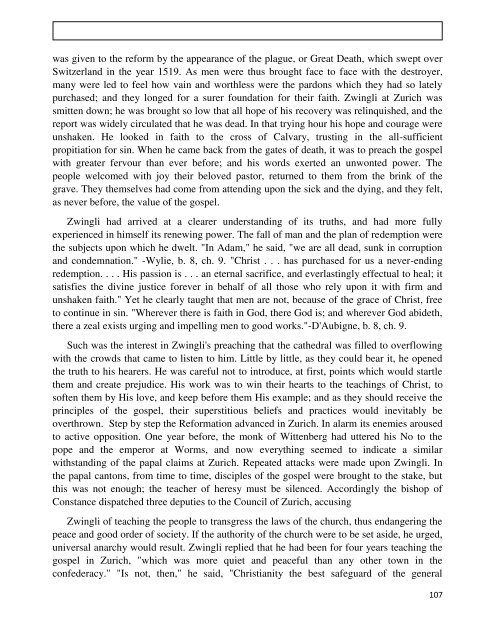Finishing the Race
Of all the games instituted among the Greeks and the Romans, the races were the most ancient and the most highly esteemed … The contests were governed by strict regulations, from which there was no appeal. Those who desired their names entered as competitors for the prize had first to undergo a severe preparatory training. Harmful indulgence of appetite, or any other gratification that would lower mental or physical vigour, was strictly forbidden. For one to have any hope of success in these trials of strength and speed, the muscles must be strong and supple, and the nerves well under control. Every movement must be certain, every step swift and unswerving; the physical powers must reach the highest mark.
Of all the games instituted among the Greeks and the Romans, the races were the most ancient and the most highly esteemed … The contests were governed by strict regulations, from which there was no appeal. Those who desired their names entered as competitors for the prize had first to undergo a severe preparatory training. Harmful indulgence of appetite, or any other gratification that would lower mental or physical vigour, was strictly forbidden. For one to have any hope of success in these trials of strength and speed, the muscles must be strong and supple, and the nerves well under control. Every movement must be certain, every step swift and unswerving; the physical powers must reach the highest mark.
Create successful ePaper yourself
Turn your PDF publications into a flip-book with our unique Google optimized e-Paper software.
was given to <strong>the</strong> reform by <strong>the</strong> appearance of <strong>the</strong> plague, or Great Death, which swept over<br />
Switzerland in <strong>the</strong> year 1519. As men were thus brought face to face with <strong>the</strong> destroyer,<br />
many were led to feel how vain and worthless were <strong>the</strong> pardons which <strong>the</strong>y had so lately<br />
purchased; and <strong>the</strong>y longed for a surer foundation for <strong>the</strong>ir faith. Zwingli at Zurich was<br />
smitten down; he was brought so low that all hope of his recovery was relinquished, and <strong>the</strong><br />
report was widely circulated that he was dead. In that trying hour his hope and courage were<br />
unshaken. He looked in faith to <strong>the</strong> cross of Calvary, trusting in <strong>the</strong> all-sufficient<br />
propitiation for sin. When he came back from <strong>the</strong> gates of death, it was to preach <strong>the</strong> gospel<br />
with greater fervour than ever before; and his words exerted an unwonted power. The<br />
people welcomed with joy <strong>the</strong>ir beloved pastor, returned to <strong>the</strong>m from <strong>the</strong> brink of <strong>the</strong><br />
grave. They <strong>the</strong>mselves had come from attending upon <strong>the</strong> sick and <strong>the</strong> dying, and <strong>the</strong>y felt,<br />
as never before, <strong>the</strong> value of <strong>the</strong> gospel.<br />
Zwingli had arrived at a clearer understanding of its truths, and had more fully<br />
experienced in himself its renewing power. The fall of man and <strong>the</strong> plan of redemption were<br />
<strong>the</strong> subjects upon which he dwelt. "In Adam," he said, "we are all dead, sunk in corruption<br />
and condemnation." -Wylie, b. 8, ch. 9. "Christ . . . has purchased for us a never-ending<br />
redemption. . . . His passion is . . . an eternal sacrifice, and everlastingly effectual to heal; it<br />
satisfies <strong>the</strong> divine justice forever in behalf of all those who rely upon it with firm and<br />
unshaken faith." Yet he clearly taught that men are not, because of <strong>the</strong> grace of Christ, free<br />
to continue in sin. "Wherever <strong>the</strong>re is faith in God, <strong>the</strong>re God is; and wherever God abideth,<br />
<strong>the</strong>re a zeal exists urging and impelling men to good works."-D'Aubigne, b. 8, ch. 9.<br />
Such was <strong>the</strong> interest in Zwingli's preaching that <strong>the</strong> ca<strong>the</strong>dral was filled to overflowing<br />
with <strong>the</strong> crowds that came to listen to him. Little by little, as <strong>the</strong>y could bear it, he opened<br />
<strong>the</strong> truth to his hearers. He was careful not to introduce, at first, points which would startle<br />
<strong>the</strong>m and create prejudice. His work was to win <strong>the</strong>ir hearts to <strong>the</strong> teachings of Christ, to<br />
soften <strong>the</strong>m by His love, and keep before <strong>the</strong>m His example; and as <strong>the</strong>y should receive <strong>the</strong><br />
principles of <strong>the</strong> gospel, <strong>the</strong>ir superstitious beliefs and practices would inevitably be<br />
overthrown. Step by step <strong>the</strong> Reformation advanced in Zurich. In alarm its enemies aroused<br />
to active opposition. One year before, <strong>the</strong> monk of Wittenberg had uttered his No to <strong>the</strong><br />
pope and <strong>the</strong> emperor at Worms, and now everything seemed to indicate a similar<br />
withstanding of <strong>the</strong> papal claims at Zurich. Repeated attacks were made upon Zwingli. In<br />
<strong>the</strong> papal cantons, from time to time, disciples of <strong>the</strong> gospel were brought to <strong>the</strong> stake, but<br />
this was not enough; <strong>the</strong> teacher of heresy must be silenced. Accordingly <strong>the</strong> bishop of<br />
Constance dispatched three deputies to <strong>the</strong> Council of Zurich, accusing<br />
Zwingli of teaching <strong>the</strong> people to transgress <strong>the</strong> laws of <strong>the</strong> church, thus endangering <strong>the</strong><br />
peace and good order of society. If <strong>the</strong> authority of <strong>the</strong> church were to be set aside, he urged,<br />
universal anarchy would result. Zwingli replied that he had been for four years teaching <strong>the</strong><br />
gospel in Zurich, "which was more quiet and peaceful than any o<strong>the</strong>r town in <strong>the</strong><br />
confederacy." "Is not, <strong>the</strong>n," he said, "Christianity <strong>the</strong> best safeguard of <strong>the</strong> general<br />
107
















